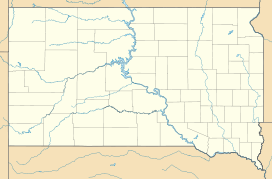Harney Peak
| Black Elk Peak | |
|---|---|

Black Elk Peak from Palmer Gulch (August 2006)
|
|
| Highest point | |
| Elevation | 7,244 ft (2,208 m) NAVD 88 |
| Prominence | 2,922 ft (891 m) |
| Listing | |
| Coordinates | 43°51′57″N 103°31′57″W / 43.865847725°N 103.532431997°WCoordinates: 43°51′57″N 103°31′57″W / 43.865847725°N 103.532431997°W |
| Geography | |
| Parent range | Black Hills |
| Topo map | USGS Custer |
| Climbing | |
| First ascent | July 24, 1875 by Valentine McGillycuddy and party |
| Easiest route | hike, Trail 9 |
Black Elk Peak (formerly Harney Peak) is the highest natural point in South Dakota. It lies in the Black Elk Wilderness area, in southern Pennington County, in the Black Hills National Forest. The peak lies 3.7 mi (6.0 km) WSW of Mount Rushmore. At 7,242 feet (2,207 m), it has been described by the Board on Geographical Names as the highest summit in the United States east of the Rocky Mountains. It is also known as Hinhan Kaga (in Lakota). "Black Elk Peak" is the name used by the Federal Board of Geographic Names.
Guadalupe Peak and Sierra Blanca also lie far to the east of the Continental Divide and are substantially higher, but they are located south of the Rockies.
The U.S. Board on Geographic Names, which has jurisdiction in federal lands, officially changed the mountain's name from "Harney Peak" to "Black Elk Peak" on August 11, 2016, honoring Black Elk, the noted Lakota Sioux medicine man for whom the Wilderness Area is named.
Professional but unofficial measurements in 2016 found the highest natural rock to be at 7,231.32 feet (2,204.11 m) NAVD88 and the nearby secondary peak slightly lower at 7,229.41 feet (2,203.52 m).
This peak was called Hinhan Kaga ("Making of Owls", after rock formations that look like owls and the association of owls with impending death) by the Lakota Sioux). They dominated this region and occupied the territory at the time of European colonization. They considered it a sacred site within the Black Hills, which they call Pahá Sápa, also written He Sapa.
...
Wikipedia

